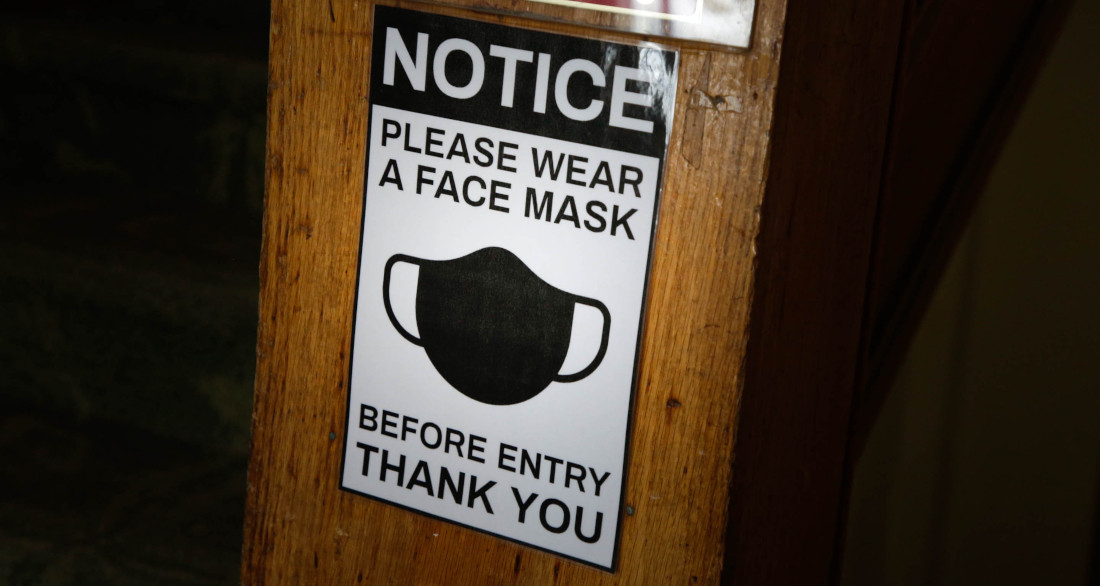Venues adapt to relaxed restrictions
Measures will continue to be in place at some venues
When the Manitoba government announced that COVID-19 restrictions would be slowly lifted, it gave entertainment venues a lot to consider.
On March 1, the provincial government lifted their restrictions for proof of vaccination for indoor venues, such as restaurants and event spaces. On March 15, all COVID-19 restrictions, including the mask mandate, were lifted. Now, many venues face a difficult decision: should they lift restrictions or keep them in place without government support?
“The proof of vaccination requirement was lifted March 1, and we’ve already had a few shows without QR restrictions,” Anthony Kowalczyk, one of the owners of the Good Willl Social Club, says. “It’s been a pretty mixed but positive response so far. I feel like most people are still a little apprehensive to jump into large crowds but want to get some sense of normalcy.”
On March 4, the Good Will Social Club announced on Instagram that although they will no longer require guests to provide proof of vaccination, groups that perform there can have their own attendance requirements.
This means some groups may ask audiences to provide proof of vaccination and wear masks, while others may impose only one of those restrictions. The Good Will says patrons should check their tickets prior to attending an event for specific requirements.
“Our staff will still be wearing masks for their safety and our customers’,” Kowalczyk says.
The hardest part, from the standpoint of the venue owners and staff, is how to navigate whether or not to keep the restrictions when they no longer have the support of the government.
“The Good Will didn’t come about the decision to lift the requirements lightly, and we are still very much cautious,” Kowalczyk says. “We spoke at length with a lot of different businesses, event producers, staff, security, customers, bands ... about how we should approach this situation. Obviously, there was no singular right answer or approach, and it’ll take some time to fully ease into these new rules – or lack thereof.”
The top priority for these businesses is to keep staff and audiences safe when things are still uncertain. This goes for both the Good Will Social Club and the West End Cultural Centre (WECC).
“We’re just going to keep (the restrictions) in place until our volunteers are comfortable, our patrons are comfortable, and our artists are comfortable,” Jason Hooper, the executive director of the WECC, says.
“There’s no point in going sooner than that. We don’t want to make people feel unwelcome ... People are going to be restricted one way or the other. Immunocompromised people won’t be able to attend or (may be) less likely to attend without masks and proof of vaccination. That just didn’t seem fair.”
On March 2, the WECC posted on Instagram that they will continue to require proof of vaccination and masks in the venue.
The response has been “overwhelmingly positive. It’s been just an avalanche of positive responses compared to the few negative ones that we’ve had,” Hooper says. “The negative ones are pretty much all-caps shouting, but, otherwise, it’s a very small minority of people.”
The Park Theatre also announced plans to keep checking proof of vaccination. Unlike the WECC, however, the Park Theatre will only keep their requirements in place until Apr. 30.
“I think that’s one of the issues with these orders. They don’t really allow for much nuance or changing, so I think it’s best to just leave (our restrictions) open-ended and just continually assess the situation as best we can,” Hooper says.
“It’s really hard without having accurate testing numbers. We’re, unfortunately, relying on hospitalizations. Which, you know, are lagging indicators of community infection, so (it’s) almost too late at that point to do anything.”
Not only do venues need to consider how restrictions (or lack thereof) will impact audience members, but they’ll also need to take into account artists who perform on their stages.
Hooper says since the WECC announced it will maintain restrictions, some groups have said they will not perform there.
“I think that’s probably one of the good things about the relaxation of the public-health orders. There are options for people who want them,” Hooper says. Although the restrictions at these three theatres may differ, they all face uncertainty with the provincial government’s rulings.
“I guess (if) public health says it’s fine, then I guess it’s fine. Maybe there’s a little bit more politics and public health involved. But, you know, it is what it is,” Hooper says. “Personally, I think it’s too soon, but I mean, what do I know? I just prefer caution when it comes to getting sick.”
Kowalczyk has similar feelings in regards to the restrictions being lifted.
“I think, like everyone else ... (I’m) confused. Rewinding the clock back two years, when we didn’t know what pandemic restrictions were/are is not an option. I am optimistically cautious that we can move in that direction, but we need to do it in the safest way possible,” Kowalczyk says.
Published in Volume 76, Number 21 of The Uniter (March 17, 2022)







